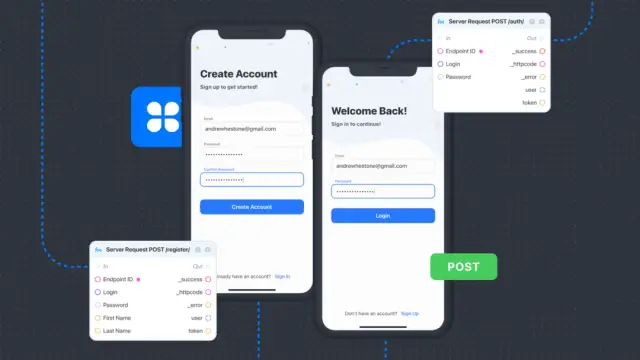Leveraging Big Data with Your Custom CRM
Explore how to leverage big data with a custom CRM to enhance customer satisfaction, improve business operations, and gain valuable insights. Learn about strategies and best practices for implementing a data-driven CRM system.

The Importance of Big Data in CRM
Big Data is transforming the way businesses interact with and manage their customers. Today Customer Relationship Management (CRM) systems have become a key tool for different kinds of companies. With the rise of advanced analytics, implementing big data in CRM can significantly improve a company's overall performance.
Big Data is a massive volume of structured and unstructured data generated from various sources (social media, online transactions, customer interactions, and IoT devices). When utilized correctly, big data helps businesses draw actionable insights, make better decisions, and improve customer experiences. The integration of big data in CRM provides numerous benefits, including:
- Enhancing Customer Understanding: By analyzing various data sources, companies can develop comprehensive customer profiles that provide detailed insights into their preferences, behaviors, and needs. This enhanced understanding enables businesses to target marketing efforts and personalize customer experiences more effectively.
- Improving Decision-Making: Big data analytics allows businesses to identify trends, correlations, and patterns in customer data, providing a basis for informed decision-making. Companies can use these insights to refine their products, services, and strategies, ultimately driving customer satisfaction and revenue growth.
- Predictive Analytics: CRM systems that leverage big data can use advanced analytical techniques, for example machine learning and artificial intelligence, to predict customer behavior and preferences. This predictive capability helps businesses anticipate customer needs, deliver proactive customer support, and optimize marketing efforts.
- Optimizing Customer Interactions: With the wealth of data available, CRM systems can analyze and track every customer interaction, ensuring that the right message is delivered at the right time through the appropriate channel. By optimizing these touchpoints, businesses can improve customer engagement and retention.
Benefits of a Custom CRM Solution
While there are numerous off-the-shelf CRM solutions available in the market, they might not adequately address your company's unique requirements. A custom CRM solution, tailored to your specific needs, can deliver several key advantages:
- Scalability and Flexibility: Custom CRM systems can be easily scaled to accommodate your business's growth, providing the flexibility to add or modify features as needed. This adaptability ensures that your CRM solution remains relevant as your company evolves.
- Data Integration: A custom CRM solution facilitates seamless integration with your existing systems and applications, allowing for efficient and accurate data synchronization. This data integration enables a unified view of all customer data, ensuring that employees have access to consistent and up-to-date information.
- Improved Efficiency: By streamlining your CRM processes and automating repetitive tasks, a custom CRM solution increases your employees' productivity. This time-saving allows your team to focus on more value-added activities, like building lasting customer relationships and crafting tailored marketing strategies.
- Competitive Edge: Investing in a custom CRM solution sets your company apart from competitors who may be using generic, off-the-shelf alternatives. A tailored CRM system empowers your unique selling propositions and enhances your customer service capabilities, ultimately delivering a competitive advantage.
- Enhanced Security: Custom CRM solutions provide a higher level of security than off-the-shelf alternatives, allowing you to implement data protection measures. By ensuring proper security protocols, your company minimizes the risk of data breaches, safeguarding sensitive customer information.

Integrating Big Data into Your Custom CRM
To effectively leverage the potential of big data with your custom CRM solution, consider the following steps:
- Define Your Objectives: It's crucial to set clear goals for integrating big data into your CRM system. Start by identifying your key objectives – whether it's enhancing customer service, optimizing marketing efforts, or gaining insights into customer preferences. Having a clear vision ensures that your big data CRM strategy aligns with your overall business goals.
- Consolidate Data Sources: Begin by consolidating the various data sources that your business utilizes, from social media channels to online transaction records. Integrating these data sources into your custom CRM system streamlines data management and gives your team access to a comprehensive and unified customer view.
- Implement Advanced Analytics: Acquiring and managing data is just the first step – to extract actionable insights, you must invest in advanced analytics technologies. These technologies include machine learning algorithms, natural language processing, and artificial intelligence, which enable data-driven decision-making and predictive capabilities.
- Ensure Data Quality: The accuracy and reliability of your insights are directly affected by the quality of your data. It's essential to implement processes that ensure data quality, including data cleansing, enrichment, and validation. Consistently maintaining high-quality data will help you avoid making critical decisions based on unreliable information.
- Train Your Team: Despite having a powerful big data CRM system, its success ultimately depends on your employees' ability to utilize it effectively. Invest in comprehensive training programs to empower your team with the necessary skills and understanding of the system, ensuring that they can make the most of your investment.
A custom CRM solution that leverages big data will unlock valuable insights, enabling your company to provide exceptional customer experiences and make strategic decisions based on sound analysis. By integrating big data into your CRM system, you position your business for sustainable growth and success.
Strategies for Leveraging Big Data in CRM
For businesses to make the most of big data in their custom CRM systems, several key strategies can be employed. By leveraging these strategies, your company can better understand customer preferences, improve overall customer satisfaction, and boost operational efficiency.
Data Collection and Analysis
Begin by collecting data from various sources across your organization, such as customer interactions, sales orders, and marketing campaigns. As you gather data, aim to identify patterns, trends, and correlations to better serve your customers and improve decision-making processes. Consider employing various tools for data analysis and mining, like machine learning algorithms and artificial intelligence, to extract actionable insights from the vast amount of data available within your CRM.
Customer Segmentation
Divide your customer base into segments based on shared attributes, such as demographics, geographic location, and purchasing behavior, to tailor your marketing strategies and customer interactions. By employing customer segmentation, your business can deliver more personalized and relevant messages, improving customer engagement and loyalty.
Predictive Analytics
Harness the power of predictive analytics to analyze historical data and recognize patterns that can help anticipate future scenarios. Predictive models can guide your business in identifying potential customer churn, forecasting sales, and developing targeted marketing campaigns.
Data Visualization
Utilize data visualization tools to clearly present key insights and trends within your CRM data. Graphs, charts, and dashboards help to quickly identify trends and gain valuable insights, enabling your team to make more data-driven decisions.
Actionable Insights for Improved Decision-Making
Convert the wealth of information provided by big data analysis into actionable insights that guide important business decisions. Make data-driven decisions to optimize your marketing strategies, streamline your sales process, and offer better customer support.
Best Practices for Implementing a Data-Driven CRM System
Following best practices during the development and implementation of a data-driven CRM system is essential for success.
Define Clear Goals
Identify the specific goals your organization wants to achieve with a data-driven CRM system. Defining your objectives will help align your implementation efforts and ensure all team members work towards the same outcome.
Ensure Data Quality
Ensure that the data integrated into your CRM is accurate, complete, and up-to-date. Data quality is fundamental to the success of a data-driven CRM system, and poor data quality can lead to inaccurate insights and misguided decisions.
Prioritize Privacy and Security
Ensuring the privacy and security of your customers’ data is vital in maintaining trust and avoiding data breaches. Implement stringent data protection measures, and educate your staff on security best practices.
Integrate with Existing Systems
Ensure your custom CRM solution integrates seamlessly with existing systems and tools to avoid creating data silos and disrupting your team's workflow. Integrated systems facilitate a holistic view of customer data, empowering your team to work more efficiently.
Provide Adequate Training to Employees
Ensure that your team members understand how to use your data-driven CRM solution effectively. Provide training and resources to help employees navigate the system and make informed decisions based on the available data.
Privacy, Security, and Compliance Considerations
A data-driven CRM system must address privacy, security, and compliance concerns to protect sensitive customer information and adhere to industry regulations.
Data Privacy
To maintain customer trust and comply with data privacy regulations such as the GDPR and CCPA, your CRM system must prioritize customer data privacy. Employ methods like data minimization and anonymization to protect sensitive information.
Security Measures
Your CRM should include security measures to prevent unauthorized access and data breaches. Ensure your solution incorporates secure access controls, encryption, and auditing features to maintain the integrity of customer data.
Comply with Industry-Specific Regulations
Depending on your industry, your CRM system may need to adhere to specific regulatory requirements. For instance, businesses in healthcare must comply with HIPAA regulations, while financial services organizations must abide by various financial regulations.
By following these best practices, strategies, and privacy, security, and compliance considerations, your organization can effectively implement a data-driven CRM solution that maximizes the potential of big data. Doing so will enhance customer satisfaction, streamline business operations, and provide valuable insights to fuel your organization’s growth.
To further support your custom CRM development needs, consider AppMaster.io, a comprehensive no-code platform that empowers businesses to create powerful backend, web, and mobile applications tailored to their unique requirements.
AppMaster: A Comprehensive Solution for Your Custom CRM Needs
AppMaster's no-code platform makes developing a custom CRM effortless and efficient. A powerful solution that harnesses the power of big data, AppMaster allows businesses to create a comprehensive CRM solution tailored to their unique needs. Below, we discuss the advantages of using AppMaster for custom CRM development and its capabilities that make it a perfect choice for your business.
Powerful No-Code Platform
AppMaster simplifies the creation of backend, web, and mobile applications, making it an ideal choice for developing a custom CRM. With its no-code approach, even non-technical users can create feature-rich applications by defining data models, business processes, and API endpoints using visual tools. By utilizing drag-and-drop functionality, users can easily craft intuitive user interfaces and generate fully interactive web and mobile applications.

Scalability and Flexibility
AppMaster solutions are generated with Go (golang) for backend applications, Vue3 framework for web applications, and Jetpack Compose or SwiftUI for mobile applications. This combination of technologies ensures that the generated applications are scalable and efficient, ready to meet the needs of businesses of all sizes, from small enterprises to large corporations. The platform offers various subscription plans to match diverse requirements, making it an accessible option for businesses with different budgets.
Zero Technical Debt
One of the most significant advantages of the AppMaster platform is the elimination of technical debt. Whenever the application requirements are altered, AppMaster regenerates applications from scratch, ensuring that they are always up-to-date and free of legacy code or issues. This means that your custom CRM will always remain optimized and free of performance bottlenecks.
Data-Driven Approach
A custom CRM developed using AppMaster empowers businesses to leverage big data and transform raw data into actionable insights. The generated applications automatically support interaction with PostgreSQL-compatible databases, allowing you to store, process, and analyze vast volumes of customer data. With its built-in support for REST API and WebSocket endpoints, you can easily connect your CRM to various external systems, like marketing tools and other analytics platforms, to extract the full potential of your big data.
Privacy, Security, and Compliance
Understanding the importance of privacy, security, and compliance for businesses, AppMaster has built-in mechanisms to ensure your custom CRM is secure and adheres to industry standards and regulations. With its comprehensive platform, you will be able to manage your CRM's security and ensure compliance with GDPR, CCPA, and HIPAA or other relevant regulations.
Innovative and Trusted Solution
With over 60,000 users, AppMaster has quickly gained popularity as a trusted solution for building custom applications. Its recognition as a High Performer and Momentum Leader in G2's No-Code Development Platforms, API Management, and Rapid Application Development categories further corroborates its reliability and effectiveness.
By opting for AppMaster for your custom CRM, you gain access to a powerful, secure and flexible solution that harnesses the power of big data. Create a comprehensive CRM that caters to your business's unique needs with ease, and enjoy the benefits of a data-driven approach to customer relationship management.
FAQ
Big data allows businesses to gather, analyze, and utilize vast amounts of customer information to make informed decisions, improve customer experiences, and tailor marketing strategies.
A custom CRM enables businesses to cater to their unique requirements and streamline processes, providing better customer experiences, valuable insights, and improved efficiency.
Key strategies include data collection and analysis, customer segmentation, predictive analytics, data visualization, and creating actionable insights for improved decision-making.
Best practices include defining clear goals, ensuring data quality, prioritizing privacy and security, integrating with existing systems, and providing adequate training to employees.
AppMaster's powerful no-code platform allows users to create comprehensive custom CRM applications, complete with backend, web, and mobile interfaces, using a visual and intuitive interface.
Businesses must ensure data privacy, secure storage and transfer of sensitive information, and adhere to industry-specific regulations and standards such as GDPR, CCPA, and HIPAA.





